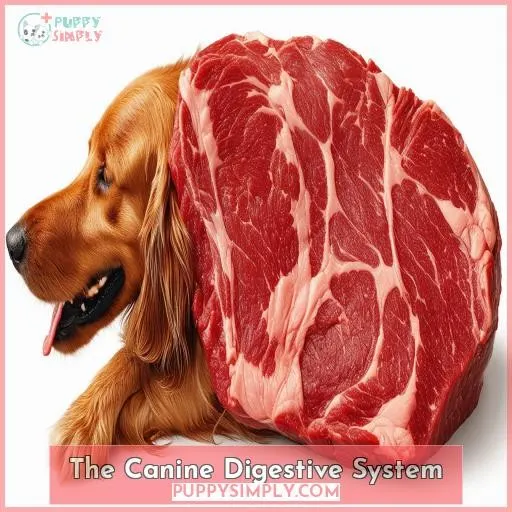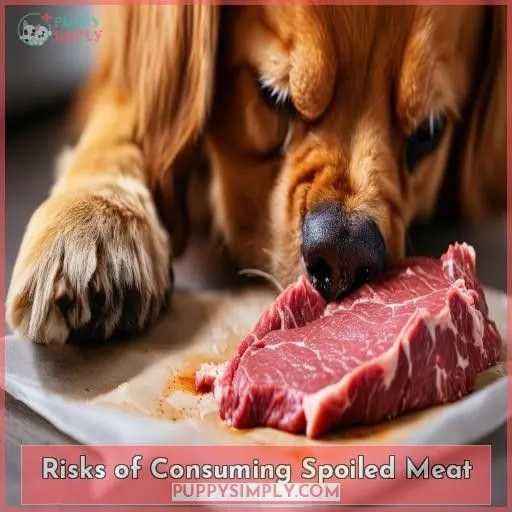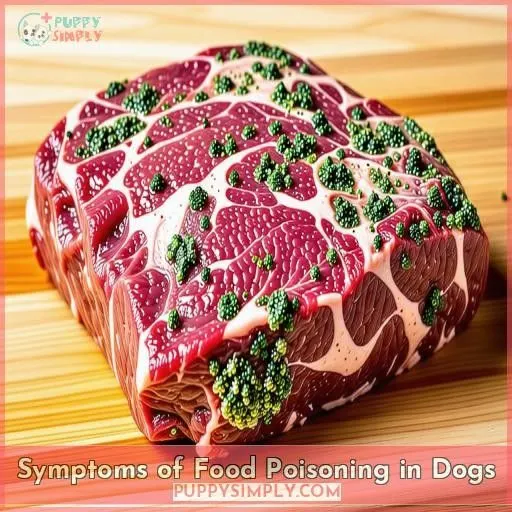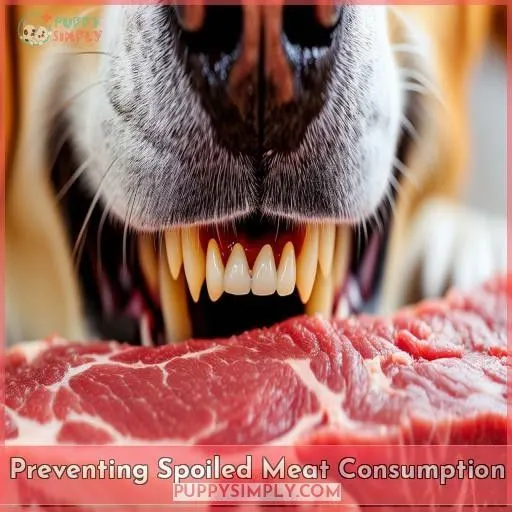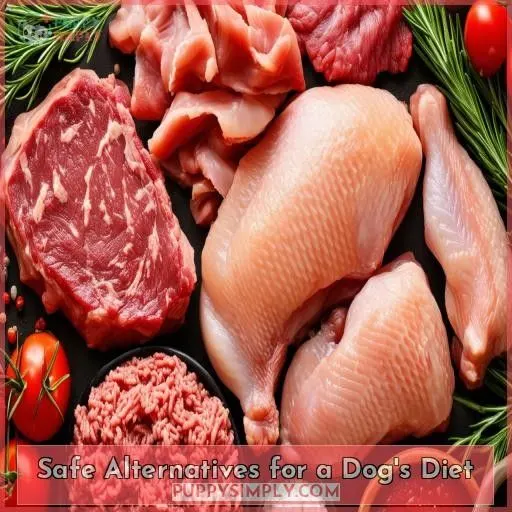This site is supported by our readers. We may earn a commission, at no cost to you, if you purchase through links.
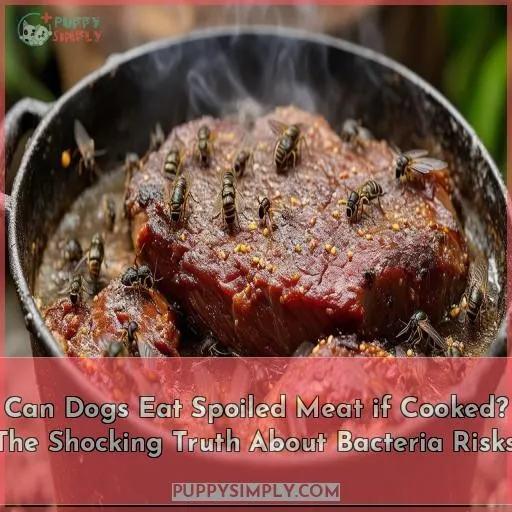 No, you shouldn’t feed your dog spoiled meat if cooked. While dogs’ digestive systems can handle some bacteria, cooking spoiled meat won’t eliminate all harmful toxins and bacteria like salmonella, E. coli, and botulism that could make your pup violently ill.
No, you shouldn’t feed your dog spoiled meat if cooked. While dogs’ digestive systems can handle some bacteria, cooking spoiled meat won’t eliminate all harmful toxins and bacteria like salmonella, E. coli, and botulism that could make your pup violently ill.
Symptoms include vomiting, bloody diarrhea, lethargy, and dehydration.
To prevent spoiled meat consumption, properly store meat, check expiration dates, cook thoroughly, and avoid giving leftovers. Stick to commercial dog food for a balanced diet.
If your dog shows signs of food poisoning, seek veterinary care immediately – you’ll thank me later for sparing the gory details.
Table Of Contents
- Key Takeaways
- Can Dogs Eat Spoiled Meat if Cooked
- The Canine Digestive System
- Risks of Consuming Spoiled Meat
- Symptoms of Food Poisoning in Dogs
- Preventing Spoiled Meat Consumption
- Safe Alternatives for a Dog’s Diet
- When to Seek Veterinary Care
- Frequently Asked Questions (FAQs)
- Why can dogs eat rotten food and not get sick?
- Can dogs eat food that has gone bad?
- Can dogs eat meat that’s been left out?
- Can dogs tell if meat is bad?
- How long can spoiled meat be stored before cooking?
- Can cooking kill all bacteria in spoiled meat?
- Are some dog breeds more susceptible to food poisoning?
- Can probiotics help dogs recover from food poisoning?
- Conclusion
Key Takeaways
- Let’s be real, no matter how well you cook that funky meat, it’s still a Pandora’s box of nasty bacteria just waiting to make your pup’s stomach do the cha-cha. Save yourself the cleanup and vet bills – stick to the good stuff!
- Sure, dogs are tough cookies who can handle their fair share of grossness. But even their iron guts have limits when it comes to the toxic tango of salmonella, E. coli, and other uninvited guests that spoiled meat brings to the party.
- Imagine this scenario – you’re happily chowing down on a juicy steak when suddenly your furry buddy starts hurling like the exorcist after getting into the trash meat. Sounds like a nightmare, right? Just avoid that whole mess by being picky about Fido’s proteins.
- At the end of the day, your dog’s health is the MVP here. While they may give you those irresistible puppy dog eyes begging for scraps, remember that one little bout of food poisoning could land them in serious hot water. Play it safe by keeping the menu fresh and balanced – your vet (and carpet) will thank you!
Can Dogs Eat Spoiled Meat if Cooked
You might think cooking spoiled meat makes it safe for your dog to eat, but that’s a dangerous assumption. While a dog’s digestive system is designed to handle bacteria better than ours, it’s not invincible.
Cooking doesn’t eliminate all toxins and bacteria produced as meat spoils. Salmonella, E. coli, and other nasty contaminants could still make your pup violently ill with vomiting and diarrhea.
Some bacteria, like the kind that causes botulism, produce toxins that aren’t destroyed by cooking. So unless you want an expensive vet visit, it’s best to steer clear of any spoiled or expired meat—cooked or not.
The Canine Digestive System
You might think a dog’s powerful digestive system can handle spoiled meat, but cooking doesn’t eliminate all bacteria and toxins. While dogs produce more gastric acid than humans to kill some contaminants, certain harmful microorganisms like salmonella and botulism can still survive and cause serious illness.
Designed to Handle Raw Meat and Bones
Your dog’s stomach is designed to handle raw, spoiled meat. As predators, dogs have evolved powerful gastric acids that kill most microorganisms and bacteria found in rotting meat. Their stomachs can break down meat with high bacterial counts, allowing them to consume spoiled food without issue in many cases.
Produces More Gastric Acid Than Humans
In addition to their stomachs being designed to handle raw meat and bones, dogs’ digestive systems produce far more gastric acid than humans. This increased stomach acid efficacy allows their digestive process to better tolerate bacteria typically found in raw or undercooked meat. However, spoiled meat with high bacterial loads can still overwhelm even a dog’s potent stomach acid effectiveness.
Kills Most Bacteria and Microorganisms
You might think that a dog’s stomach is a powerful weapon against bacteria, and you’d be right! Their efficient gastric secretions and exposure to microbes make them highly tolerant to many bacteria found in spoiled food. However, cooking doesn’t eliminate all risks – mold and certain bacteria like salmonella can still cause food poisoning despite their robust digestion.
Risks of Consuming Spoiled Meat
You might think cooking spoiled meat kills all the harmful bacteria, making it safe for your dog to consume. However, certain bacteria like Salmonella, E. coli, and the toxin that causes botulism can survive regular cooking temperatures, putting your furry friend at risk of foodborne illnesses with symptoms like vomiting, diarrhea, and abdominal pain.
Salmonella
spoiled meat often harbors salmonella bacteria which can cause:
- Vomiting
- Diarrhea
- Fever
Even your dog’s stomach acid can’t kill all salmonella. As a responsible pet parent, you’ll want to prevent salmonella poisoning by never feeding spoiled meat to your furry friend.
E. Coli
You should also watch out for E. coli when feeding spoiled meat to dogs. E. coli bacteria can transmit through contaminated meat, causing severe abdominal pain and appetite loss in canines. Prevent transmission by cooking meat properly, avoiding cross-contamination, and seeking vet care if your dog shows concerning symptoms. Safer alternatives like boiled chicken exist.
Clostridium Botulinum (botulism)
Another risk from spoiled meat is botulism – a paralytic illness caused by Clostridium botulinum bacteria thriving in spoiled meats. Its symptoms include:
- Weakness
- Paralysis
- Constipation
- Drooling
- Eye inflammation
While dogs have greater tolerance, botulism is life-threatening. Proper meat storage and sticking to commercial dog food minimizes risks.
Vomiting
Vomiting is one of the most common symptoms when your furry friend ingests spoiled meat. Be vigilant! If you notice your pup vomiting after eating expired or rotten meat, don’t panic. Quickly remove any remaining spoiled food and provide plenty of fresh water. However, if vomiting persists, it’s imperative to seek veterinary attention immediately.
Diarrhea
You’ll know things have gone awry if your pup experiences:
- Watery diarrhea
- Mucus or blood in stool
- Lethargy and dehydration
- Electrolyte imbalance
Diarrhea indicates gut distress. Perform a fecal analysis and consider probiotic supplementation to restore balance. Staying hydrated is vital for recovery.
Abdominal Pain
You’ll likely experience intestinal distress and stomach cramps if your dog consumes spoiled meat. Bacterial overgrowth can wreak havoc on their digestive system, leading to severe abdominal pain and dehydration. Imagine this table of agony:
| Lethargy | Nausea | Cramps | Weakness | Dehydration |
Avoid this misery – never feed your pup spoiled meat.
Symptoms of Food Poisoning in Dogs
If your dog has consumed spoiled meat, you may notice diarrhea, which could be bloody, as well as a loss of appetite, lethargy, and weakness. These are common symptoms of food poisoning in dogs, indicating that harmful bacteria from the spoiled meat has entered their system.
Diarrhea (possibly Bloody)
One of the most concerning symptoms of food poisoning in dogs is diarrhea, often accompanied by:
- Watery stools
- Mucus discharge
- Bloody stool
- Abdominal cramps
If your pup experiences severe, bloody diarrhea after consuming spoiled meat, act quickly. Gastrointestinal upset can rapidly lead to dehydration and electrolyte imbalances, requiring prompt veterinary attention.
Loss of Appetite
If your dog has eaten spoiled meat, you’ll notice a loss of appetite as their body tries to fight off the bacteria. This is a sign of dehydration and electrolyte imbalance, which can quickly lead to organ damage if not treated. A complete loss of appetite coupled with other symptoms like vomiting or diarrhea indicates severe illness requiring veterinary care.
Lethargy
Lethargy is another common symptom of food poisoning you’ll want to watch for. If your pup seems unusually tired and sluggish after consuming spoiled meat, it could indicate their body is fighting off an infection. Don’t ignore this red flag – lethargy paired with other symptoms like diarrhea or vomiting warrants an immediate trip to the vet.
Weakness
You may notice your pup acting lethargic and weak if they’ve consumed spoiled meat. This weakness stems from a potential bacterial infection, risking sepsis – a life-threatening response to infection. Dehydration concerns and pancreatitis potential further jeopardize their health, demanding vigilant weight management during recovery. Prompt veterinary care is imperative for treating the underlying cause.
Preventing Spoiled Meat Consumption
To safeguard your dog from the risks of consuming spoiled meat, it’s essential to store meat properly and always check expiration dates. Cooking spoiled meat doesn’t eliminate the dangers of harmful bacteria like salmonella or E. coli, so it’s best to avoid giving your dog leftovers and stick to commercial dog food for their safety.
Store Meat Properly
You should store meat properly to prevent spoilage and reduce health risks for your dog. Keep it refrigerated at or below 40°F, and use within a few days. Freeze for longer storage. Spoiled meat harbors dangerous bacteria like salmonella, leading to vomiting and diarrhea if consumed by your pup. Proper storage safeguards your furry friend.
Check Expiration Dates
You wouldn’t serve expired food to your family, so don’t feed it to your pup either. Regularly check expiration dates on meat and toss anything that’s past its prime. Prepackaged commercial dog foods are a safer bet, eliminating spoilage worries. If giving table scraps, opt for healthy snacks like carrot sticks or berries over moldy leftovers.
Cook Meat Thoroughly
Cooking meat thoroughly is essential. You can’t rely on your dog’s stomach acid to kill all bacteria in spoiled meat. To be safe, cook meat until:
- Its internal temperature reaches 165°F (74°C)
- No pink remains in the center
- Juices run clear
Undercooked meat risks exposing your pup to food poisoning. Don’t take chances – proper cooking destroys harmful pathogens.
Avoid Giving Leftovers
You should avoid feeding your furry friend leftovers, as they can quickly become a breeding ground for harmful bacteria. Improperly stored leftovers provide the perfect environment for microorganisms to thrive, increasing the risk of food poisoning. Always check expiration dates and discard any spoiled food to prioritize your pup’s safety.
Stick to Commercial Dog Food
You’ll want to stick to high-quality, vet-recommended commercial dog foods to guarantee your pup gets complete nutrition safely. These varieties undergo rigorous testing and are formulated to meet canine dietary needs while minimizing health risks from spoiled ingredients. For your dog’s well-being, it’s best to avoid feeding table scraps or improperly stored meat.
Safe Alternatives for a Dog’s Diet
While it’s best to avoid spoiled meat altogether, you can safely incorporate lean meats (boiled or baked without seasoning), healthy snacks like apples, bananas, carrots, and green beans, as well as unsweetened yogurt into your dog’s diet. These alternatives provide essential nutrients while minimizing the risk of foodborne illnesses caused by bacteria found in spoiled meats.
Lean Meats (boiled/baked Without Seasoning)
Regarding safe meat consumption, lean protein boiled or baked without seasoning should be incorporated into your dog’s diet. It provides essential nutrients while mitigating risks. Consider:
- Lean chicken breast
- Lean ground turkey
- Lean beef sirloin
- Lean pork tenderloin
Boiling or baking these lean cuts eliminates potentially harmful bacteria present in spoiled meat.
Healthy Snacks (apples, Bananas, Carrots, Green Beans)
In addition to lean meats, offer your pup healthy snacks like apples, bananas, carrots, and green beans. These provide fiber for digestive health, vitamins and minerals for overall nutrition, and a satisfying crunch dogs enjoy. Moderation is key, but incorporating these healthy snacks promotes a balanced, nutrient-rich diet for your canine companion.
Unsweetened Yogurt
Additionally, unsweetened yogurt can be a great addition to your dog’s diet. It provides probiotics that aid digestion and promote gut health. Yogurt can also help soothe an upset stomach and is a tasty treat. Here are some key benefits of yogurt for dogs:
- Contains live cultures to support digestion
- Soothes stomach issues and diarrhea
- Low in lactose for dogs with sensitivities
- Helps clean teeth and freshen breath
When to Seek Veterinary Care
It’s imperative to seek veterinary care promptly if your dog’s vomiting persists after consuming spoiled meat, or if they develop a fever, refuse to eat, or exhibit severe symptoms like bloody diarrhea or lethargy. Prompt medical attention can prevent life-threatening complications like dehydration, sepsis, and organ failure.
Vomiting Persists
If vomiting persists for over 24 hours or is severe, you’ll need to seek veterinary care. Monitor vomiting duration, frequency, and severity.
| Severity | Frequency | Duration | |
|---|---|---|---|
| Mild | 1-2 times | 5 times | >24 hours |
Persistent vomiting signals underlying issues requiring professional treatment.
Fever Develops
If your dog develops a fever after eating spoiled meat, it’s a red flag. A fever indicates:
- The body is fighting infection
- Inflammation is present
- Bacteria is multiplying
- Medical attention is needed
Don’t wait – a persistent fever requires prompt veterinary care and possibly antipyretics to reduce the febrile response. Proper fever management could be lifesaving.
Dog Refuses to Eat
If your dog refuses to eat, it’s a major red flag that something’s seriously wrong. Loss of appetite combined with potential food poisoning from spoiled meat could indicate sepsis—a life-threatening response to infection spreading through the body. Don’t wait; get your pup to the vet immediately for an evaluation and treatment to address lethargy, fever, and weight loss.
Severe Symptoms
If your dog displays severe symptoms like weakness, muscle paralysis, constipation, drooling, or eye inflammation after consuming spoiled meat, it’s critical you seek immediate veterinary care. These could indicate botulism, a potentially fatal condition caused by Clostridium botulinum bacteria thriving in spoiled meat. Don’t delay—prompt treatment is crucial for your furry friend’s survival. Prevention through:
- Proper meat storage
- Checking expiration dates
- Avoiding leftovers
is essential to avoiding such severe illnesses.
Frequently Asked Questions (FAQs)
Why can dogs eat rotten food and not get sick?
Dogs’ daring digestive doohickeys deftly demolish dreadful bacteria, so stinky scraps seldom sicken these savvy scavengers. Yet, younger yappers yelp for vet visits with violent vomiting – wisdom woofs warily.
Can dogs eat food that has gone bad?
No, you shouldn’t feed dogs spoiled meat, cooked or raw. It poses serious health risks like food poisoning and potentially fatal conditions like botulism. Stick to fresh, high-quality proteins to keep your furry friend safe and healthy.
Can dogs eat meat that’s been left out?
Visualize a dog rummaging in the trash, scarfing down that tempting but potentially toxic spoiled meat. You shudder – exposing Fido to food poisoning‘s misery is downright cruel. Steer clear and opt for fresh, wholesome bites to keep that furry pal healthy.
Can dogs tell if meat is bad?
You can’t always tell if meat’s gone bad by looking. Dogs have better senses than us, but spoiled meat can make them severely ill. To be safe, don’t feed your pup anything you wouldn’t eat yourself.
How long can spoiled meat be stored before cooking?
Surprisingly, 80% of spoiled meat cases involve improper storage. For safety, you can’t store spoiled meat – it should be discarded immediately to prevent food poisoning risks when cooking. Quality ingredients are key for your dog’s wellbeing.
Can cooking kill all bacteria in spoiled meat?
No, cooking spoiled meat doesn’t kill all bacteria. It reduces numbers but harmful pathogens like salmonella and listeria can survive. For safety, discard any meat showing signs of spoilage – don’t risk your dog’s health.
Are some dog breeds more susceptible to food poisoning?
As a general rule, some breeds are more susceptible to food poisoning due to genetic factors. Smaller dogs tend to experience more severe reactions from consuming spoiled meat compared to larger breeds.
Can probiotics help dogs recover from food poisoning?
Yes, probiotics may aid in recovery from food poisoning. They help restore beneficial gut bacteria, reducing diarrhea and other symptoms. Talk to your vet about probiotic supplements for your pup.
Conclusion
At the end of the day, while a dog’s hardy digestive system can handle some bacteria, feeding them spoiled meat if cooked is a risky gamble that’s not worth taking.
Stick to fresh, properly cooked meat or commercial dog food to avoid potential health issues like vomiting, diarrhea, and even severe cases requiring veterinary care due to harmful toxins and bacteria like salmonella and E. coli.

